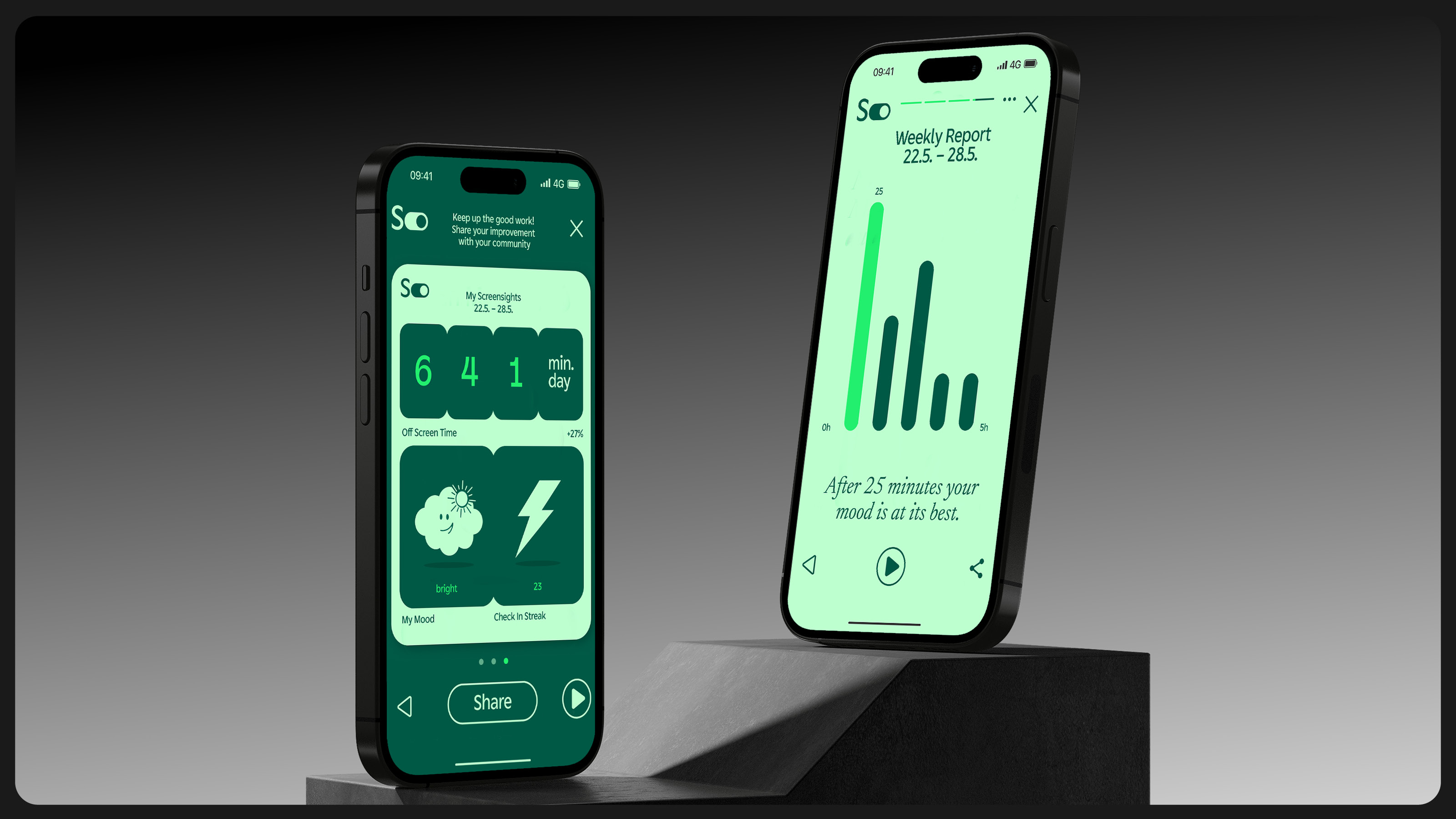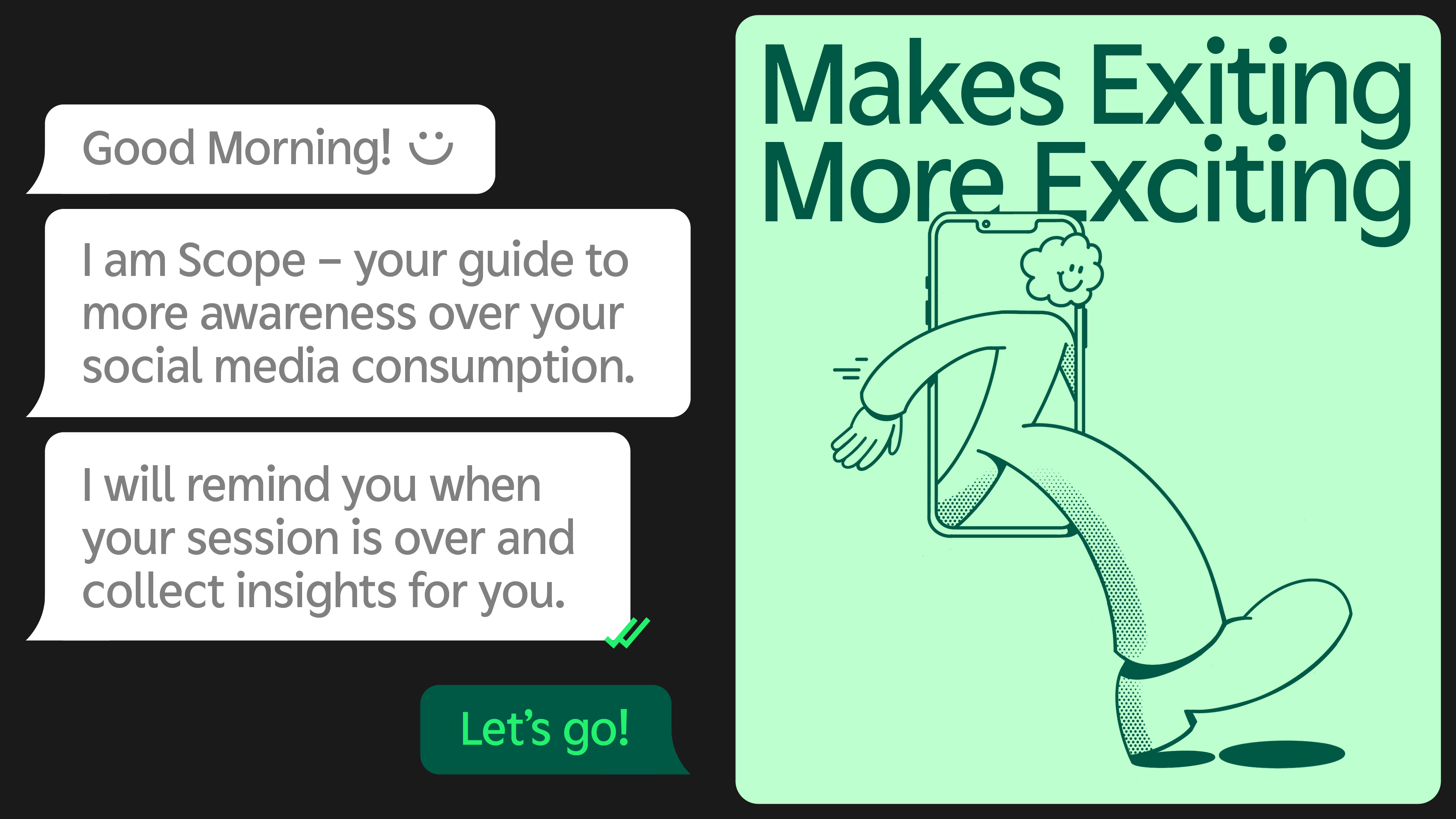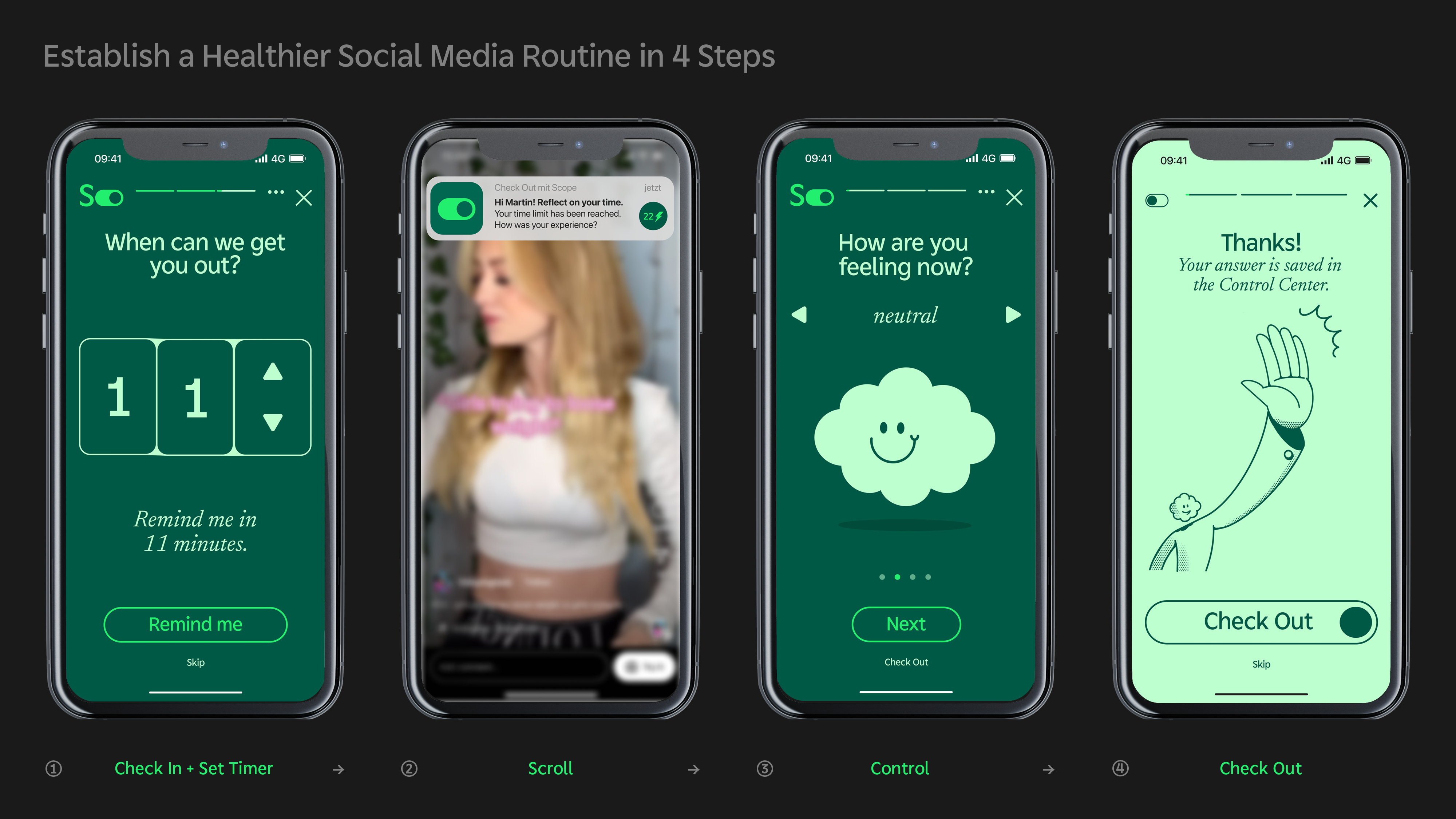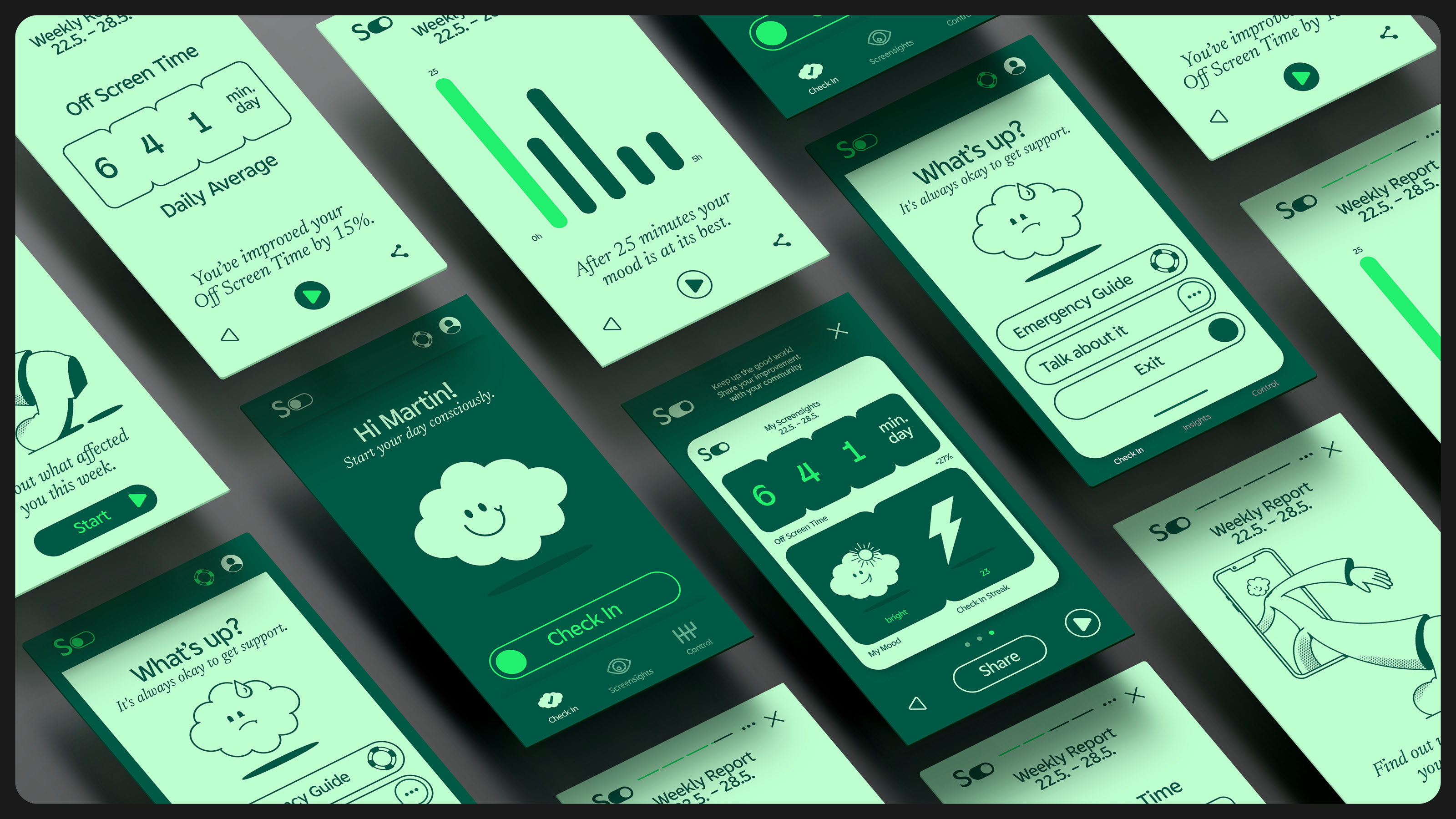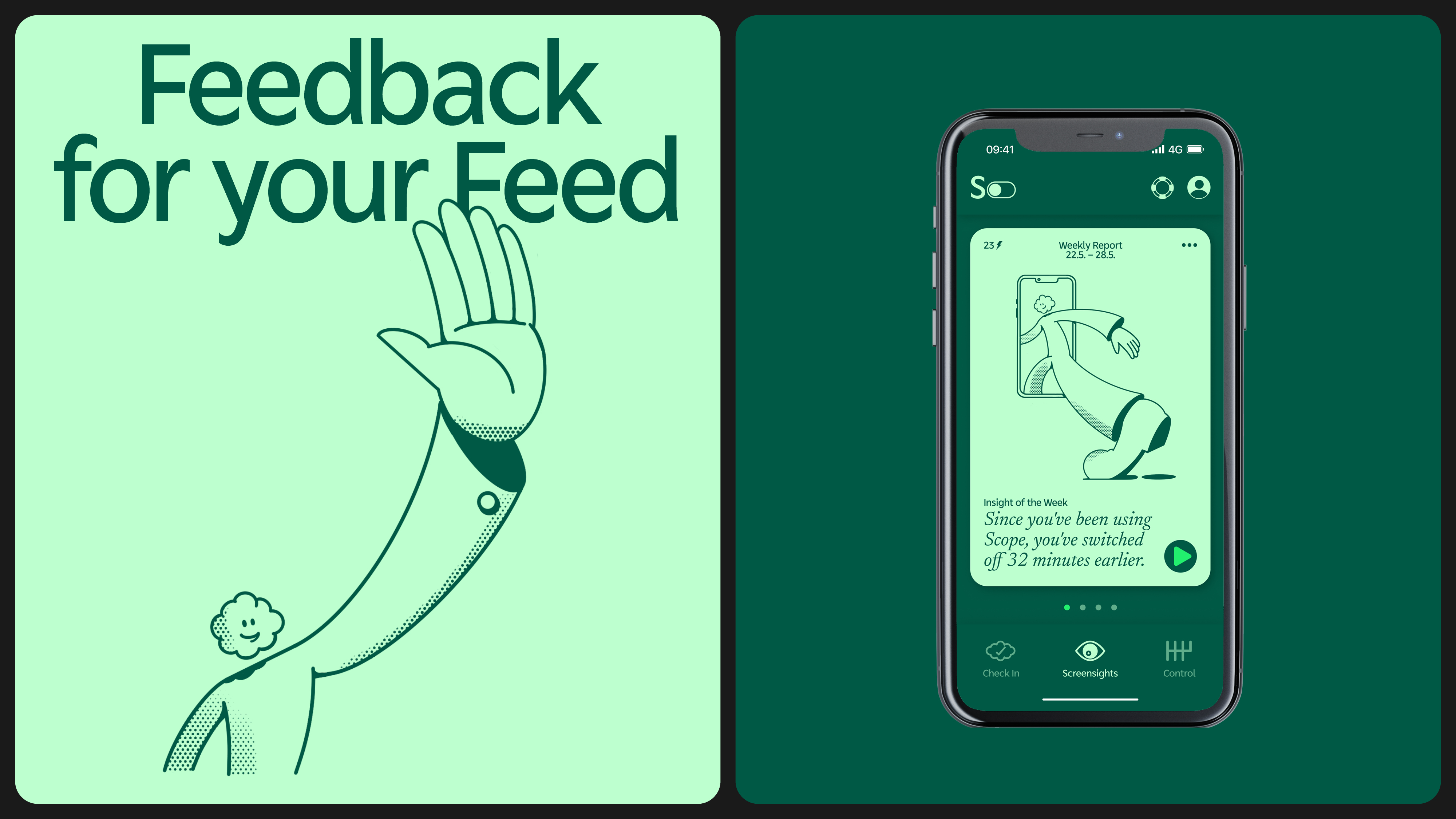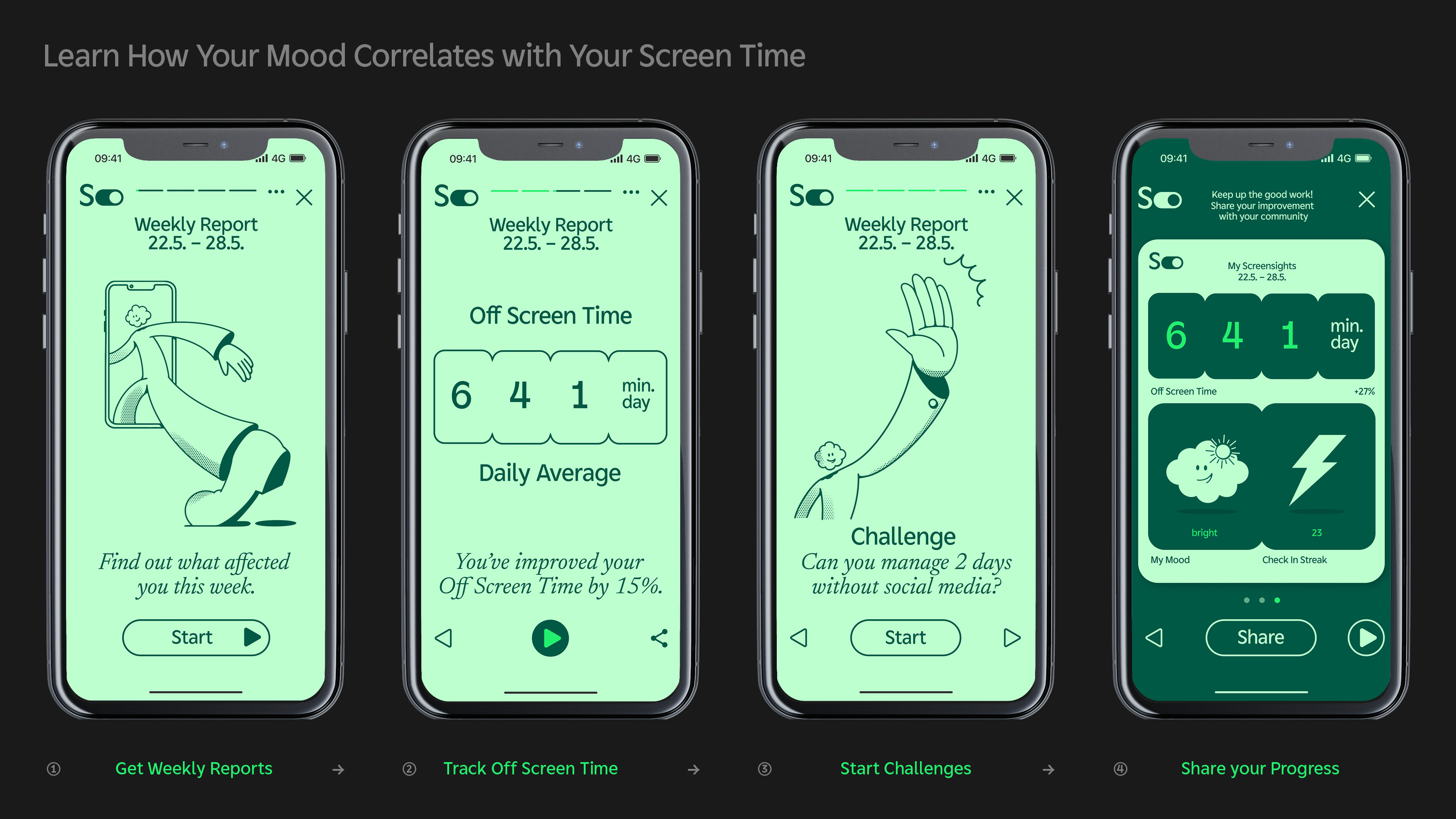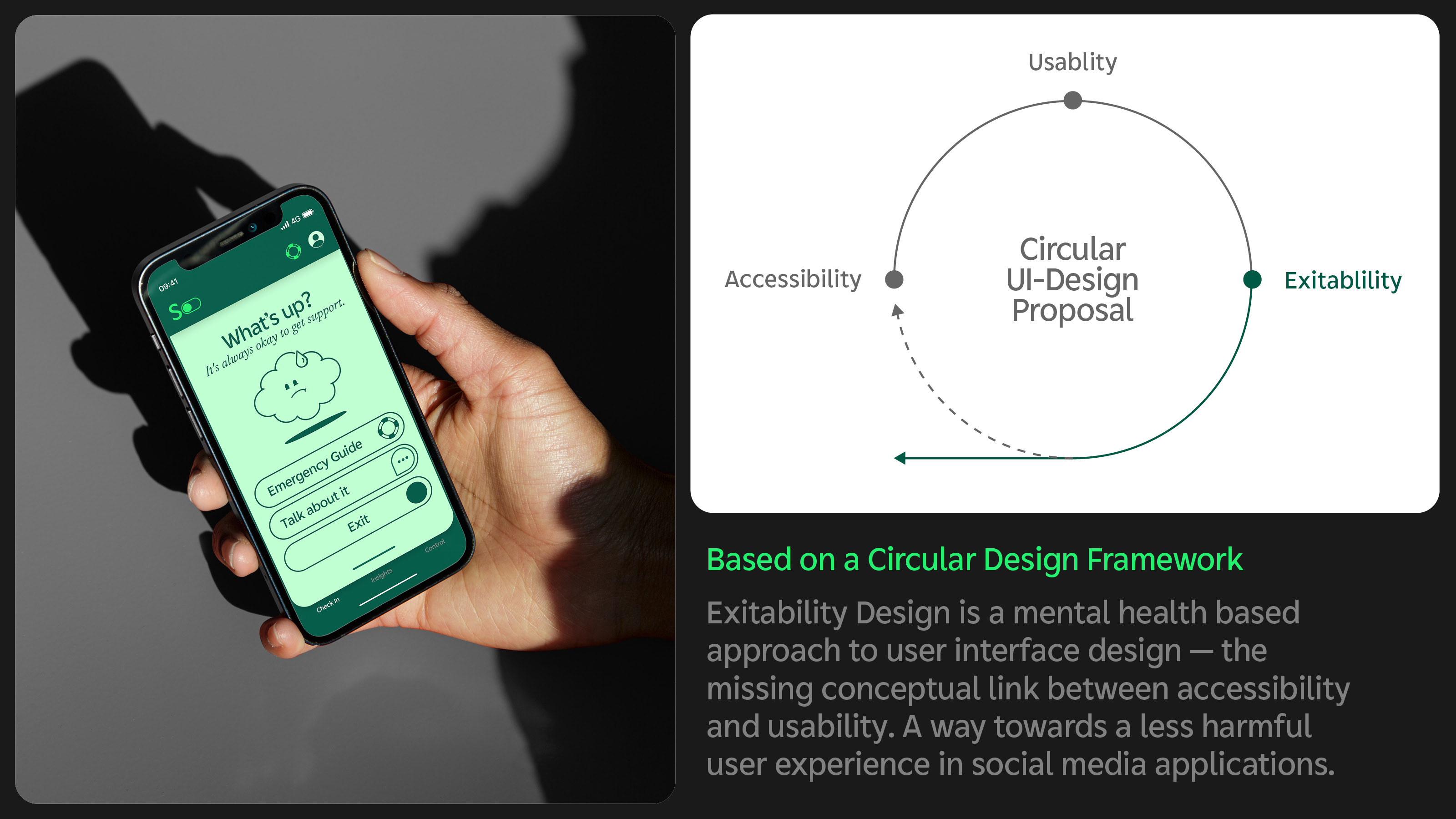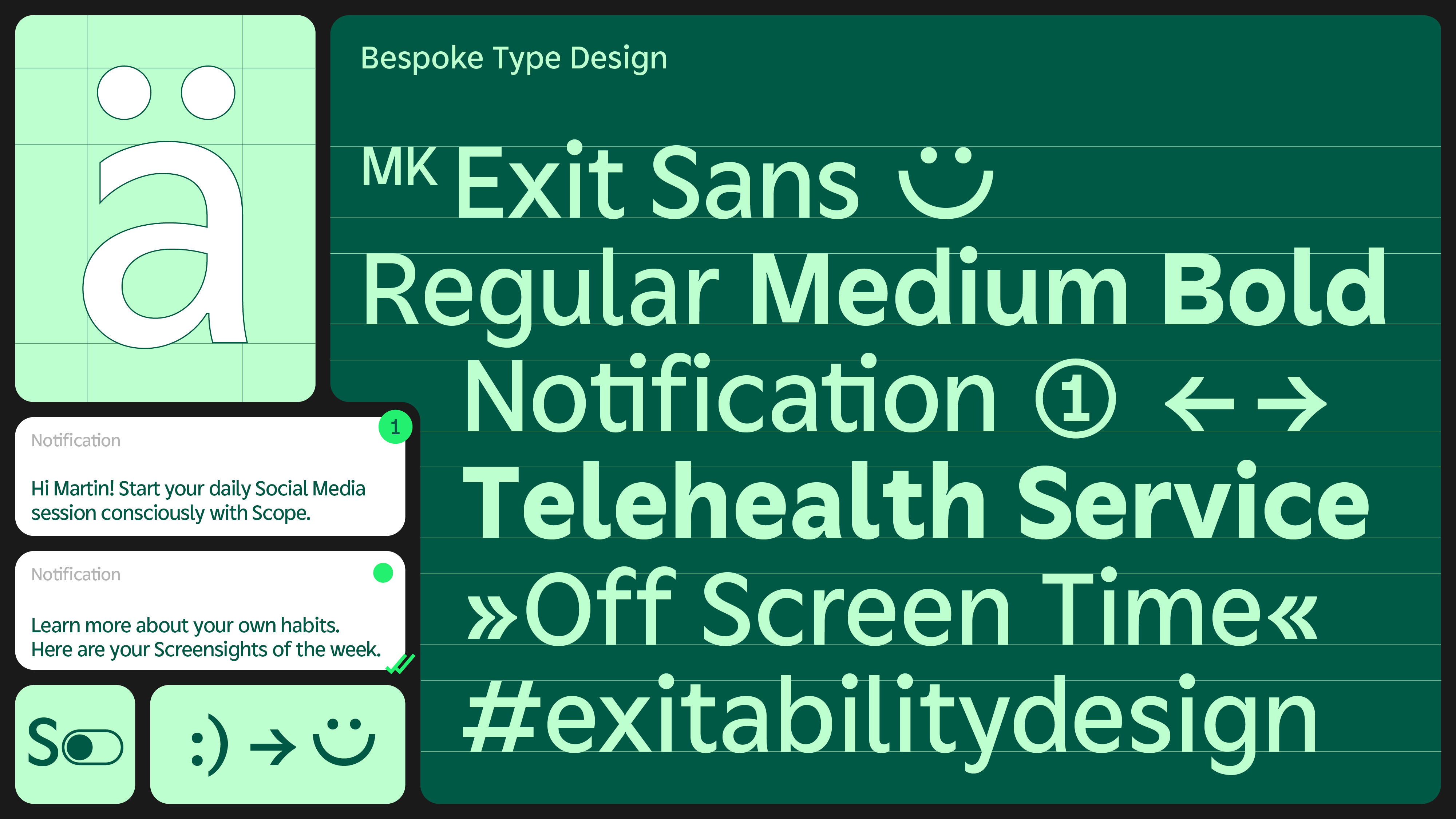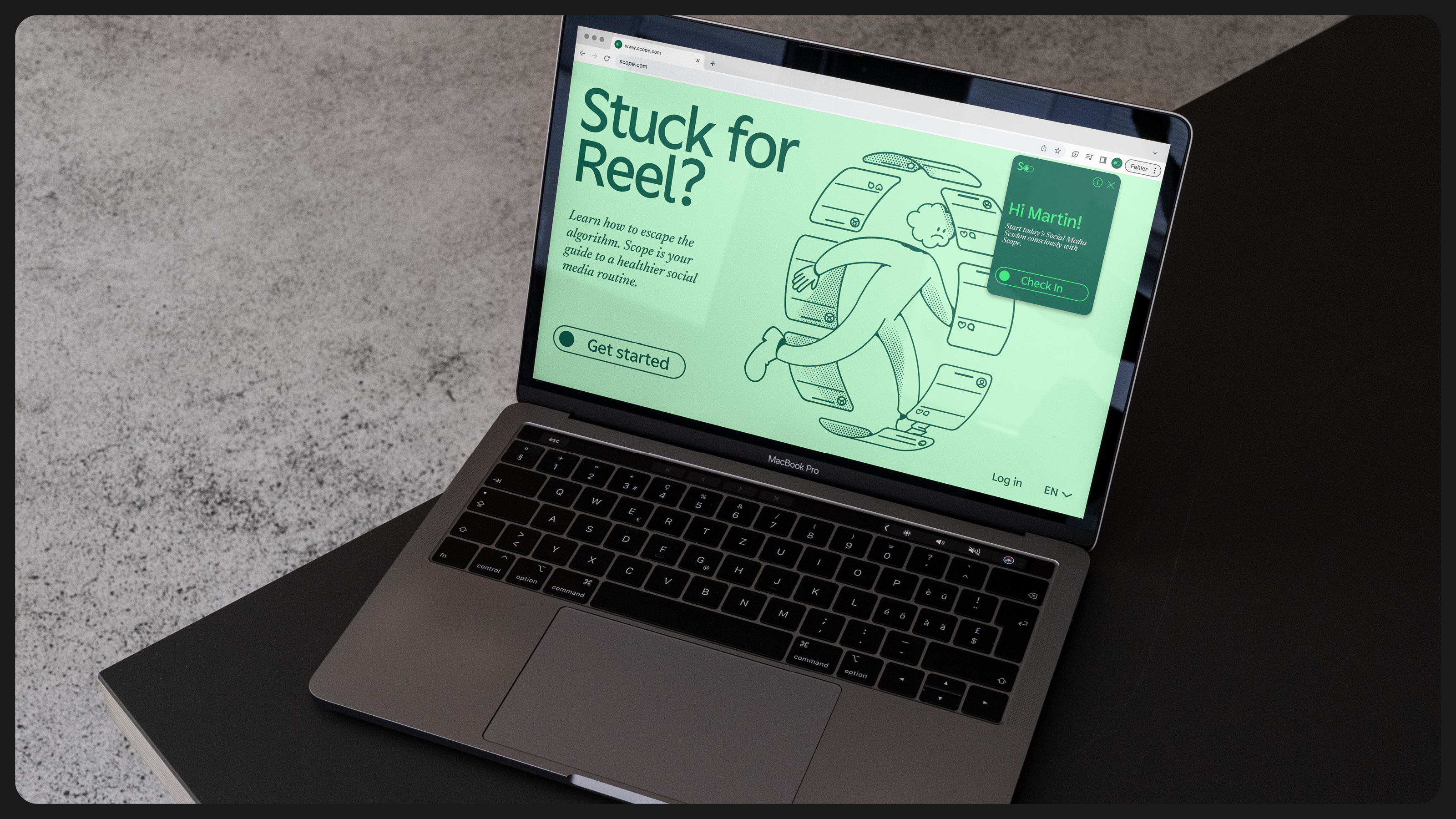Prioritising the places and people that need it the most
Scope
Scope – A Mental Health Guide for Social Media
Scope is a mental health app for social media. It combines a screen time tracker with a mood journal.
Through a daily check-in, users rate their mood before and after using social media. With the information provided, Scope supports users with weekly insights into their own mental health. By this, it helps them to gain awareness of how their screen time affects their wellbeing. Users are encouraged to build new online routines that enable them to foster a healthier relation to social media.
Through a daily check-in, users rate their mood before and after using social media. With the information provided, Scope supports users with weekly insights into their own mental health. By this, it helps them to gain awareness of how their screen time affects their wellbeing. Users are encouraged to build new online routines that enable them to foster a healthier relation to social media.
Austria
National
Mainly urban
It refers to other types of transformations (soft investment)
Prototype level
No
No
As an individual
Scope is a Mental Health Guide for Social Media. The app combats the global mental health crisis among youth with a hands-on tool for digital self-awareness and resilience, combining a mood journal with a screen time tracker.
Scope provides young social media users with detailed, personalized, and easily accessible information into how their online activity influences their own psychological wellbeing. With Scope, users complete a brief mental health check-in before and after opening social media. This gamified intervention routine fosters self-reflection and awareness while extracting valuable insights from the generated data. Thus, the app can improve a deeper understanding of the relationship between screen time and mental wellbeing.
Designed for digital natives aged 15 – 35, Scope supports those struggling with problems caused by social media such as addiction, anxiety, depression, exposure to triggering content, and manipulation through fake news.
The app acts as a personal guide that helps to safely navigate these challenges in digital environments.
By bridging the interconnected themes of individual well-being (SDG 3: Good Health and Well-being) and media literacy (SDG 4: Quality Education), Scope serves as a critical tool for fostering resilience in the digital age.
The apps ultimate goal is to change today's social media landscape – that is increasingly dominated by hate, manipulation and inequal power dynamics – for the better. It’s values align with the European Unions commitment of holding platform providers responsible for their actions and prioritizing the users’ individual needs first.
Led by a design-based approach, Scope is developed by an interdisciplinary team of designers and health experts from Austria, Germany and Denmark.
Scope provides young social media users with detailed, personalized, and easily accessible information into how their online activity influences their own psychological wellbeing. With Scope, users complete a brief mental health check-in before and after opening social media. This gamified intervention routine fosters self-reflection and awareness while extracting valuable insights from the generated data. Thus, the app can improve a deeper understanding of the relationship between screen time and mental wellbeing.
Designed for digital natives aged 15 – 35, Scope supports those struggling with problems caused by social media such as addiction, anxiety, depression, exposure to triggering content, and manipulation through fake news.
The app acts as a personal guide that helps to safely navigate these challenges in digital environments.
By bridging the interconnected themes of individual well-being (SDG 3: Good Health and Well-being) and media literacy (SDG 4: Quality Education), Scope serves as a critical tool for fostering resilience in the digital age.
The apps ultimate goal is to change today's social media landscape – that is increasingly dominated by hate, manipulation and inequal power dynamics – for the better. It’s values align with the European Unions commitment of holding platform providers responsible for their actions and prioritizing the users’ individual needs first.
Led by a design-based approach, Scope is developed by an interdisciplinary team of designers and health experts from Austria, Germany and Denmark.
Strengthening the Mental Health of Youth
Building Resilience and Awareness
Fostering Digital Literacy
Reducing Screentime by promoting
Re-Imagining our Relationship to Social Media
Our project has a multi-faceted sustainability strategy, targeting several dimensions of sustainability.
We aim to increase social sustainability in two ways. First, by returning social media users’ agency so that they can make more informed choices about their consumption of media products. We envisage that this would lead to more sustainable connections between citizens, and lowering the grip-hold that modern mass-media and disinformation have on our societies.
More informed social media users tend to reduce overall use of media devices and services. According to some studies, digital media consumption in our age accounts for up to 3% of global greenhouse gas emissions. Even a 20% reduction in consumption – within our geography – would amount to a significant reduction in greenhouse gas emissions.
Lastly, by being a fully locally developed app from Vienna, Austria that itself does not require significant server capacity. Together with our partners we aim to operate on a fully carbon-neutral basis. By using innovative hosting services that dynamically adapt to the required workload we can significantly reduce the ecological impact of our server capacities in comparison to common practice.
We aim to increase social sustainability in two ways. First, by returning social media users’ agency so that they can make more informed choices about their consumption of media products. We envisage that this would lead to more sustainable connections between citizens, and lowering the grip-hold that modern mass-media and disinformation have on our societies.
More informed social media users tend to reduce overall use of media devices and services. According to some studies, digital media consumption in our age accounts for up to 3% of global greenhouse gas emissions. Even a 20% reduction in consumption – within our geography – would amount to a significant reduction in greenhouse gas emissions.
Lastly, by being a fully locally developed app from Vienna, Austria that itself does not require significant server capacity. Together with our partners we aim to operate on a fully carbon-neutral basis. By using innovative hosting services that dynamically adapt to the required workload we can significantly reduce the ecological impact of our server capacities in comparison to common practice.
Scope aims to deliver a seamless, user-centered health experience for social media. Led by a state-of-the-art design philosophy, the project has received international recognition for its visual and conceptual design strategy.
At it's core, the project explores the immense impact of social media on young adults' mental health. Problems like depression, addiction, or eating disorders can be amplified by the algorithmic nature of social media platforms.They are the result of intentional design choices made by platform providers.
Scope tackles these issues, by redesigning how we engage with use social media. It introduces a structured routine around our daily consumption, incorporating a mental health check-in before and a debriefing after each social media session.
This process is guided by a newly developed design principle called "Exitability Design"—a concept that integrates accessibility and usability within a circular framework, ensuring that digital platforms not only facilitate easy entry but also provide seamless, low-barrier options for users to disengage.
The user interface is designed for effortless navigation, featuring a custom typeface, illustrative elements that foster trust, and a calming color scheme to enhance the overall experience.
The project originated as an academic thesis project at the University of Applied Arts in Vienna, created, developed and designed by art director and graphic designer Martin Klaffensteiner.
Since it's start, the project has been awarded with the following design prizes:
- Europan Design Award (Gold),
- The Art Directors Germany Award (Gold),
- Ceasar Award Upper Austria (Gold)
- Creativ Club Austria Venus Award (Silver).
- Social Impact Award (Incubation Phase)
At it's core, the project explores the immense impact of social media on young adults' mental health. Problems like depression, addiction, or eating disorders can be amplified by the algorithmic nature of social media platforms.They are the result of intentional design choices made by platform providers.
Scope tackles these issues, by redesigning how we engage with use social media. It introduces a structured routine around our daily consumption, incorporating a mental health check-in before and a debriefing after each social media session.
This process is guided by a newly developed design principle called "Exitability Design"—a concept that integrates accessibility and usability within a circular framework, ensuring that digital platforms not only facilitate easy entry but also provide seamless, low-barrier options for users to disengage.
The user interface is designed for effortless navigation, featuring a custom typeface, illustrative elements that foster trust, and a calming color scheme to enhance the overall experience.
The project originated as an academic thesis project at the University of Applied Arts in Vienna, created, developed and designed by art director and graphic designer Martin Klaffensteiner.
Since it's start, the project has been awarded with the following design prizes:
- Europan Design Award (Gold),
- The Art Directors Germany Award (Gold),
- Ceasar Award Upper Austria (Gold)
- Creativ Club Austria Venus Award (Silver).
- Social Impact Award (Incubation Phase)
Scope aims to create a safe(r), more mindful space in the digital world.
Our mission is to destigmatize mental illness and psychological problems by providing users with tools to describe, reflect on, and communicate their emotions triggered by online experiences. This includes working with individuals whose struggles – such as anxiety, depression, or compulsive and addictive behaviors– are exacerbated by social media.
Through regular user tests and co-creation techniques, the experience and feedback of the target audience are directly integrated in the development of the app.
Scope is not a replacement for professional therapy but rather a complementary tool that integrates seamlessly into users' daily digital habits. By operating directly within social media environments – where many of these issues originate – the app serves as an immediate, hands-on resource for self-awareness and emotional regulation.
The user experience is designed to be empathetic, intuitive, and adaptable to individual needs. Every element of the app follows the principle of low-barrier accessibility: ensuring high visual contrast, clear legibility, and intuitive navigation. Additionally, Scope’s social entrepreneurship strategy prioritizes affordability, making mental health support more accessible to a wider audience.
Our mission is to destigmatize mental illness and psychological problems by providing users with tools to describe, reflect on, and communicate their emotions triggered by online experiences. This includes working with individuals whose struggles – such as anxiety, depression, or compulsive and addictive behaviors– are exacerbated by social media.
Through regular user tests and co-creation techniques, the experience and feedback of the target audience are directly integrated in the development of the app.
Scope is not a replacement for professional therapy but rather a complementary tool that integrates seamlessly into users' daily digital habits. By operating directly within social media environments – where many of these issues originate – the app serves as an immediate, hands-on resource for self-awareness and emotional regulation.
The user experience is designed to be empathetic, intuitive, and adaptable to individual needs. Every element of the app follows the principle of low-barrier accessibility: ensuring high visual contrast, clear legibility, and intuitive navigation. Additionally, Scope’s social entrepreneurship strategy prioritizes affordability, making mental health support more accessible to a wider audience.
Scope is designed to support the complex circumstances of individuals experiencing the negative psychological effects of excessive social media use.This includes people with mental health disorders, addictive behaviors, or stress symptoms, enhanced by digital environments.
To address the diverse needs of this target group, Scope integrates scientifically backed user testing into its development process. The user feedback will actively shape the app’s features and functionality, ensuring a user-centered and evidence-based approach.
Our research partner, Moritz Meister, a PhD candidate in psychology at the University of Vienna, will oversee the testing process. He will conduct qualitative interviews in an open, unbiased setting. The main findings are contributing to his doctoral dissertation on mood-tracking apps.
USER TESTING
1. Proof of Concept (March 2025)
A small group of selected participants representing the core target group will test a prototype of the app’s essential functions over a two-week period.
Their experiences will be transcribed, categorized, and analyzed. Key findings will be directly integrated into the next phase of prototyping, optimization and validation.
2. Expanded Testing Phase (May 2025)
The second testing stage includes a large, diverse group, selected based on age, socio-cultural background, and preexisting mental health conditions.
This phase will incorporate quantitative analysis, measuring aspects such as screen time reduction, mood fluctuations, and changes in user’s intentions and behavior.
After the app’s launch, continuous user testing will remain an integral part of Scope’s development, ensuring ongoing refinement and adaptation based on real-world user experiences.
To conclude, Scope is built in direct collaboration with its users.Their insights, emotions, and lived experiences will shape design decisions, ensuring the app provides a truly user-centered mental health support system.
To address the diverse needs of this target group, Scope integrates scientifically backed user testing into its development process. The user feedback will actively shape the app’s features and functionality, ensuring a user-centered and evidence-based approach.
Our research partner, Moritz Meister, a PhD candidate in psychology at the University of Vienna, will oversee the testing process. He will conduct qualitative interviews in an open, unbiased setting. The main findings are contributing to his doctoral dissertation on mood-tracking apps.
USER TESTING
1. Proof of Concept (March 2025)
A small group of selected participants representing the core target group will test a prototype of the app’s essential functions over a two-week period.
Their experiences will be transcribed, categorized, and analyzed. Key findings will be directly integrated into the next phase of prototyping, optimization and validation.
2. Expanded Testing Phase (May 2025)
The second testing stage includes a large, diverse group, selected based on age, socio-cultural background, and preexisting mental health conditions.
This phase will incorporate quantitative analysis, measuring aspects such as screen time reduction, mood fluctuations, and changes in user’s intentions and behavior.
After the app’s launch, continuous user testing will remain an integral part of Scope’s development, ensuring ongoing refinement and adaptation based on real-world user experiences.
To conclude, Scope is built in direct collaboration with its users.Their insights, emotions, and lived experiences will shape design decisions, ensuring the app provides a truly user-centered mental health support system.
The concept for Scope was initially developed as an academic thesis project at the University of Applied Arts Vienna, combining both written research and practical design implementation. This approach enabled a deep exploration of the psychological impact of social media, supported by expert consultations across the mental health and medical fields.
Key consultations included Dr. Carola Kaltenbach, an Austrian psychotherapist, and Dr. Verena Struckmann, a public health researcher at the Technical University of Berlin, whose insights were essential in refining the project's concept and strategic direction.
In the design phase, the app’s user interface (UI) and user experience (UX) were developed through feedback loops with experts such as Christoph Schlossnikel, Hongwei Tang, and Gerald Geier. The project also benefited from the artistic and conceptual guidance of professors Ingmar Thies, Lisa Schultz, and Matthias Spaetgens, who’s feedback has been elementary for the artistic direction of the project.
Following the completion of the thesis, Scope received the Social Impact Award 2024 (SIA), which allowed the project to enter SIA’s three-month incubation program. During this time, the project evolved from a design concept into a social business. Business coach Malgorzata Goraczek provided strategic mentoring, helping the team form a core group, secure a programming partner, and develop a detailed business plan.
The technical development of the app will be carried out by Lean Coders, a Vienna-based coding agency known for its cutting-edge cross-platform approach. Their expertise will ensure the app’s development is aligned with the latest technological standards.
Key consultations included Dr. Carola Kaltenbach, an Austrian psychotherapist, and Dr. Verena Struckmann, a public health researcher at the Technical University of Berlin, whose insights were essential in refining the project's concept and strategic direction.
In the design phase, the app’s user interface (UI) and user experience (UX) were developed through feedback loops with experts such as Christoph Schlossnikel, Hongwei Tang, and Gerald Geier. The project also benefited from the artistic and conceptual guidance of professors Ingmar Thies, Lisa Schultz, and Matthias Spaetgens, who’s feedback has been elementary for the artistic direction of the project.
Following the completion of the thesis, Scope received the Social Impact Award 2024 (SIA), which allowed the project to enter SIA’s three-month incubation program. During this time, the project evolved from a design concept into a social business. Business coach Malgorzata Goraczek provided strategic mentoring, helping the team form a core group, secure a programming partner, and develop a detailed business plan.
The technical development of the app will be carried out by Lean Coders, a Vienna-based coding agency known for its cutting-edge cross-platform approach. Their expertise will ensure the app’s development is aligned with the latest technological standards.
The project is being developed in a core team of four experts whit a complementary skillset, closely working together and
Mag. Martin Klaffensteiner – Project Lead & Design:
As the founder of Scope, he designed, and developed the app as part of his university thesis. A trained designer and art director, he holds a degree from the University of Applied Arts Vienna, equipping him with a broad skill set in both technical and conceptual design, essential for the app's development. His contributions extend beyond the initial idea, user interface (UI), and user experience (UX) design – he also developed a custom typeface and created all texts, illustrations, and animations for the app.
Angela Neubauer – Product Development:
Is an interdisciplinary artist and Design Investigations student at the University of Applied Arts Vienna. Her work focuses on contemporary challenges such as sustainability, interdependence, and care work. Trained in industrial design, she combines conceptual thinking with hands-on prototyping. At Scope, she contributes her design expertise to shape the app’s user experience (UX).
Moritz Meister, MSc – Scientific Expert
Serves as the scientific expert in Scope’s development. A PhD candidate in psychology at the University of Vienna, he specializes in researching mood tracking apps and emotional self-measurement. His work has been published in multiple academic journals, and his expertise includes teaching university seminars, conducting expert interviews, and public outreach. During Scope’s development, he will conduct qualitative user tests and scientifically analyze and validate the app’s impact.
Clemens Schally, MSc – Business Strategist & Finance:
Is responsible for financial planning. He is an international expert in innovation policy, market analysis, and business strategy. With a background and several years of experience in health entrepreneurship, he currently works in Copenhagen as a Global Project Lead for Novo Nordisk.
Mag. Martin Klaffensteiner – Project Lead & Design:
As the founder of Scope, he designed, and developed the app as part of his university thesis. A trained designer and art director, he holds a degree from the University of Applied Arts Vienna, equipping him with a broad skill set in both technical and conceptual design, essential for the app's development. His contributions extend beyond the initial idea, user interface (UI), and user experience (UX) design – he also developed a custom typeface and created all texts, illustrations, and animations for the app.
Angela Neubauer – Product Development:
Is an interdisciplinary artist and Design Investigations student at the University of Applied Arts Vienna. Her work focuses on contemporary challenges such as sustainability, interdependence, and care work. Trained in industrial design, she combines conceptual thinking with hands-on prototyping. At Scope, she contributes her design expertise to shape the app’s user experience (UX).
Moritz Meister, MSc – Scientific Expert
Serves as the scientific expert in Scope’s development. A PhD candidate in psychology at the University of Vienna, he specializes in researching mood tracking apps and emotional self-measurement. His work has been published in multiple academic journals, and his expertise includes teaching university seminars, conducting expert interviews, and public outreach. During Scope’s development, he will conduct qualitative user tests and scientifically analyze and validate the app’s impact.
Clemens Schally, MSc – Business Strategist & Finance:
Is responsible for financial planning. He is an international expert in innovation policy, market analysis, and business strategy. With a background and several years of experience in health entrepreneurship, he currently works in Copenhagen as a Global Project Lead for Novo Nordisk.
The app’s USP is in the combination of a mood journal and a screentime tracking tool, directly linked to social media consumption. This innovative concept allows for a deep, data-based analysis on the interdependence of online activity and wellbeing – all while remaining highly functional and accessible to it's users.
Our cross-disciplinary approach, bridging mental health and digital literacy, offers a significant distinction against existing mental health applications.
The app’s psychology-based concept responds to a demand for practical and accessible mental health solutions on social media, that is not yet catered to by other competing solutions.
By applying a razor-sharp focus on usability and habit development, we outperform existing technology-led solutions, that remain cumbersome to use, and have poor retention rates.
In addition, our design-first approach to digital products is rarely used in an industry dominated by engineering talent. By switching up this hierarchy, we hope to establish a new paradigm. With American dominance in technology development, we believe that new approaches that are uniquely European will be necessary to build our own response to Silicon Valley. Moreover, by leading development with design, we hope to create products that are more understanding of direct human needs and make human interaction better.
Our cross-disciplinary approach, bridging mental health and digital literacy, offers a significant distinction against existing mental health applications.
The app’s psychology-based concept responds to a demand for practical and accessible mental health solutions on social media, that is not yet catered to by other competing solutions.
By applying a razor-sharp focus on usability and habit development, we outperform existing technology-led solutions, that remain cumbersome to use, and have poor retention rates.
In addition, our design-first approach to digital products is rarely used in an industry dominated by engineering talent. By switching up this hierarchy, we hope to establish a new paradigm. With American dominance in technology development, we believe that new approaches that are uniquely European will be necessary to build our own response to Silicon Valley. Moreover, by leading development with design, we hope to create products that are more understanding of direct human needs and make human interaction better.
Our approach to developing Scope is built on three core pillars that enable flexible, innovative, and inclusive decision-making:
1. RESPONSIBLE DESIGN THINKING
Ethically driven design thinking is the foundation of decision making at scope. Our development process follows an iterative cycle of research, analysis, creation, validation, and optimization, ensuring continuous improvement. We prioritize responsible, user-centered solutions, driven by creativity and innovation, rather than financial gain.
2. CO-CREATION & USER-CENTRICITY
Our interdisciplinary core team brings together experts in health management, psychology, design, programming, and finance – covering all key areas needed in the project’s development.
Beyond our internal expertise, Scope is developed in close collaboration with a user testing group and external consultants, including therapists, educators, and social workers. Their insights ensure the app remains practical, unbiased, effective, and user-centered.
3. SOCIAL ENTREPRENEURSHIP
Scope was created to challenge the status quo in response to the youth mental health crisis. Our goal is to provide a barrier-free, affordable, and inclusive service, prioritizing accessibility over profit and individual well-being over growth maximization.
We operate with the principles of inclusion, diversity, and responsibility, ensuring that Scope remains an ethical and impactful solution for mental health in the digital age.
1. RESPONSIBLE DESIGN THINKING
Ethically driven design thinking is the foundation of decision making at scope. Our development process follows an iterative cycle of research, analysis, creation, validation, and optimization, ensuring continuous improvement. We prioritize responsible, user-centered solutions, driven by creativity and innovation, rather than financial gain.
2. CO-CREATION & USER-CENTRICITY
Our interdisciplinary core team brings together experts in health management, psychology, design, programming, and finance – covering all key areas needed in the project’s development.
Beyond our internal expertise, Scope is developed in close collaboration with a user testing group and external consultants, including therapists, educators, and social workers. Their insights ensure the app remains practical, unbiased, effective, and user-centered.
3. SOCIAL ENTREPRENEURSHIP
Scope was created to challenge the status quo in response to the youth mental health crisis. Our goal is to provide a barrier-free, affordable, and inclusive service, prioritizing accessibility over profit and individual well-being over growth maximization.
We operate with the principles of inclusion, diversity, and responsibility, ensuring that Scope remains an ethical and impactful solution for mental health in the digital age.
Three parts of our project can be replicated and transferred to other contexts and beneficiaries:
1. IMPROVING OUR UNDERSTANDING OF DIGITAL MENTAL HEALTH
First, our innovative approach to mental health tracking in digital solutions will prove to be an attractive solution to a variety of partners, from government agencies to private players, seeking to better understand how the use digital of services and products – such as social media platforms – affect customers. Progressing our Mental Health App Scope, we will build the knowledge and capabilities to easily offer our solutions, insights and (anonymized) mental health data to other partners, such as research institutions, journalists, or hospitals, increasing the impact.
2. PIONEERING MENTAL HEALTH-BASED DESIGN
Second, our design-first approach to digital products is highly innovative. We hope that pioneering this methodology will inspire more actors in the technology sector to shift their view on how development should work. Putting human interaction first, we believe that existing problems can be solved in wholly new ways.
We hope, that our theoretical framework of "Exitability-Design" will find recognition in more design adaptations.
3. EDUCATIONAL WORKSHOPS
We plan to further develop Scope’s services in an interactive workshops setting on mental health and digital literacy. Directed at students, these awareness-building workshops can be implemented in schools or as a complementary service for clients of therapists. The expertise and knowledge of Scope will be distributed as an open source tool-box to those who need it the most.
1. IMPROVING OUR UNDERSTANDING OF DIGITAL MENTAL HEALTH
First, our innovative approach to mental health tracking in digital solutions will prove to be an attractive solution to a variety of partners, from government agencies to private players, seeking to better understand how the use digital of services and products – such as social media platforms – affect customers. Progressing our Mental Health App Scope, we will build the knowledge and capabilities to easily offer our solutions, insights and (anonymized) mental health data to other partners, such as research institutions, journalists, or hospitals, increasing the impact.
2. PIONEERING MENTAL HEALTH-BASED DESIGN
Second, our design-first approach to digital products is highly innovative. We hope that pioneering this methodology will inspire more actors in the technology sector to shift their view on how development should work. Putting human interaction first, we believe that existing problems can be solved in wholly new ways.
We hope, that our theoretical framework of "Exitability-Design" will find recognition in more design adaptations.
3. EDUCATIONAL WORKSHOPS
We plan to further develop Scope’s services in an interactive workshops setting on mental health and digital literacy. Directed at students, these awareness-building workshops can be implemented in schools or as a complementary service for clients of therapists. The expertise and knowledge of Scope will be distributed as an open source tool-box to those who need it the most.
In 2020 The World Heath Organisation for the first time announced a global mental health crisis. This brought about a scientific paradigm shift where psychological health is increasingly being viewed as a societal, cultural and media-related matter, instead of an individual problem.
Especially in young adults and adolescents, a significant number of psychological studies proves an ever growing prevalence of anxiety disorders and depression. The symptoms are often closely linked to excessive social media use and can be amplified by algorithm-generated content. In extreme cases, experts even classify the problem as "Social Media Addiction".
The primary indication for this diagnosis is a loss in control over one's usage-time. This can even result in negative personal consequences such as suffering from sleep deprivation, eating disorders, or social isolation.
(See SDG 3: „Good Health and Wellbeing“ )
Furthermore, a lack of educational programs on the risks of social media consumption as well as insufficient training of digital literacy skills can lead to unreflected and unlimited use of social media. This has also been proven by a recent study which revealed a significant knowledge gap in the digital competences of young adults – which reflects in their ability to research, communicate and create information in digital environments. (See SDG 4: „Quality Education“)
Especially in young adults and adolescents, a significant number of psychological studies proves an ever growing prevalence of anxiety disorders and depression. The symptoms are often closely linked to excessive social media use and can be amplified by algorithm-generated content. In extreme cases, experts even classify the problem as "Social Media Addiction".
The primary indication for this diagnosis is a loss in control over one's usage-time. This can even result in negative personal consequences such as suffering from sleep deprivation, eating disorders, or social isolation.
(See SDG 3: „Good Health and Wellbeing“ )
Furthermore, a lack of educational programs on the risks of social media consumption as well as insufficient training of digital literacy skills can lead to unreflected and unlimited use of social media. This has also been proven by a recent study which revealed a significant knowledge gap in the digital competences of young adults – which reflects in their ability to research, communicate and create information in digital environments. (See SDG 4: „Quality Education“)
CURRENT STATUS:
The concept, business model, core functionality, user interface design, branding, and communication strategy have been fully developed. The project is currently at a technology readiness level 3. The implementation will take place in three iterative phases throughout 2025, followed by the official launch.
PHASE 1: PROOF OF CONCEPT (Jan – Mar 2025)
In the first phase, a Proof of Concept (PoC) prototype will be developed, focusing on the technical implementation of the app’s core function (Check-in Process). This initial version will be tested through scientifically supported qualitative user studies over a two-week period. The insights gained from these tests will directly inform the optimization and validation of the core function.
PHASE 2: RAPID PROTOTYPING (Mar – Aug 2025)
Based on the findings from the initial user testing, the app’s additional features will be developed, redesigned, and refined. The service will be adapted to meet the needs and feedback of the target audience, evolving into a Minimum Viable Product (MVP). This phase will be supported by ongoing scientific analysis and multiple feedback loops, evaluating the product from user experience, accessibility, interface design, and business viability perspectives.
PHASE 3: BETA VERSION (Aug – Dec 2025)
In this phase, developers will create a fully functional Beta version incorporating all app features. A larger, quantitative user testing phase will follow, identifying bug fixes, screen design adjustments, and technical optimizations. By the end of 2025, the app is expected to be market-ready. Simultaneously, a launch strategy will be developed, including multimedia marketing campaigns, PR efforts, and strategic collaborations.
The concept, business model, core functionality, user interface design, branding, and communication strategy have been fully developed. The project is currently at a technology readiness level 3. The implementation will take place in three iterative phases throughout 2025, followed by the official launch.
PHASE 1: PROOF OF CONCEPT (Jan – Mar 2025)
In the first phase, a Proof of Concept (PoC) prototype will be developed, focusing on the technical implementation of the app’s core function (Check-in Process). This initial version will be tested through scientifically supported qualitative user studies over a two-week period. The insights gained from these tests will directly inform the optimization and validation of the core function.
PHASE 2: RAPID PROTOTYPING (Mar – Aug 2025)
Based on the findings from the initial user testing, the app’s additional features will be developed, redesigned, and refined. The service will be adapted to meet the needs and feedback of the target audience, evolving into a Minimum Viable Product (MVP). This phase will be supported by ongoing scientific analysis and multiple feedback loops, evaluating the product from user experience, accessibility, interface design, and business viability perspectives.
PHASE 3: BETA VERSION (Aug – Dec 2025)
In this phase, developers will create a fully functional Beta version incorporating all app features. A larger, quantitative user testing phase will follow, identifying bug fixes, screen design adjustments, and technical optimizations. By the end of 2025, the app is expected to be market-ready. Simultaneously, a launch strategy will be developed, including multimedia marketing campaigns, PR efforts, and strategic collaborations.

